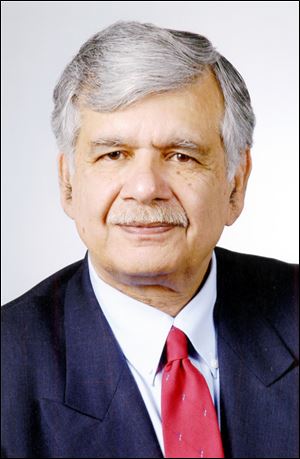
COMMENTARY
At UM, a look into a side of Pakistan few see
3 speakers expand audience’s view of nation
4/14/2014
Hussain
The Center for South Asian Studies at the University of Michigan recently held a conference on Pakistan. The speakers were two women and a man who, amid all the bad news emanating from the country, brought a breath of fresh air.
Arif Hussain (no relation) is a Karachi-based urban architect who specializes in transforming slums into healthy, livable spaces. His efforts on behalf of the poor and disfranchised have put him at odds with the sprawling metropolis’ interest groups, including the government, criminal gangs, police, and politicians.
Mr. Hussain believes that slow and steady progress to rehabilitate slums is better than demolition and relocation of people to unfamiliar locations. He has received prestigious international awards for his work and his philosophy.
Then there was an unusual artist: Born and raised in Lahore, Shazia Sikander has broken ground by taking the Indo-Persian art of miniature painting and adding layers of cultural, political, and religious history. She marshals her enormous talent to draw and paint stories of the history of the Indian subcontinent that are often painful in their depiction of injustices of the past.
Ms. Sikander won a 2006 MacArthur Foundation “genius” grant. Her works are in the permanent collections of the Museum of Modern Art, the Whitney Museum of American Art, the Guggenheim Museum, the San Francisco Museum of Modern Art, and the Smithsonian Institution. She divides her time between Lahore and New York.
The third speaker was Sabeen Mahmud, a 30-something dynamo who is a graphic designer and a tech guru. Growing up in Karachi, she saw the gradual disappearance of civil discourse from the city’s public square and decided to create a community space called PeaceNiche.
A small second-floor office in a commercial district in Karachi has become a magnet for writers, activists, and artists. The idea was to bring people together for democratic discourse and conflict resolution through intellectual and cultural engagement. Since its inception about 10 years ago, the idea has spawned many other activities.
In Pakistan, Saudi-inspired extreme religious orthodoxy, and its occasional transformation into militancy and terrorism, set the limits of public discourse. Poverty can be measured not only with the yardstick of money, but also with intellectual currency.
At PeaceNiche, moderate to liberal Pakistani intellectuals, academics, artists, musicians, and poets explore common values that are increasingly sidelined in favor of religiously driven agendas.
Another component of PeaceNiche is Science Terminal and Philosophy 101, which invites scientists and philosophers to converse with common people to help them understand in simple language the basics of science and philosophy.
A PeaceNiche program called Literature Lab provides an open-microphone opportunity to writers and poets to present their work. On Friday evenings, musicians and music enthusiasts gather for jam sessions.
Taking a cue from Marshall McLuhan, the late Canadian public intellectual and philosopher of communication theory who famously said that art is anything you can get away with, PeaceNiche has created a program called Farar (Urdu for “escape”). It is a visual arts and new-media space for artists, photographers, and graphic designers. The idea is to inculcate visual literacy among children and adults, and to showcase emerging talent.
In Pakistan, English is fast replacing Urdu as the preferred medium of communication among educated people. PeaceNiche’s Urdu Preservation Project raises awareness of the rich literary traditions of the language by showcasing vibrant Urdu literature.
PeaceNiche extends Ms. Mahmud’s efforts to India across the formidable divisions between India and Pakistan. It encourages people from the two often-warring countries to talk, via the Internet, about shared artistic, linguistic, and musical traditions. A successful Pakistan-India social media festival was held in 2012.
Ms. Mahmud pushes the envelope to make the extreme right and the government uncomfortable. For many years, YouTube has been banned in Pakistan. She considers it to be an important medium for the growth of ideas.
So she started a social media campaign called Kholo BC to make her point. In Urdu, “kholo” means “open” and “BC” are the initials for an insulting profanity.
These three speakers were a joy to hear, and expanded the audience’s view of a country that many Americans don’t truly understand.
Dr. S. Amjad Hussain is a retired Toledo surgeon whose column appears every other week in The Blade.
Contact him at: aghaji@bex.net